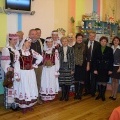Political Prisoners in Belarus: How to Break the Vicious Circle

Sannikov and Bandarenka
Former Belarusian presidential candidate Andrei Sannikov and his main campaign aide Dzmitry Bandarenka have been released from prison on the eve of the Christian Orthodox Easter. It looks like the first step in the de-escalation of the worst EU-Belarus conflict in history. It is likely that expectations of Vladimir Putin’s pressure after his re-election contributed more to the long-awaited release of these two political prisoners, rather than the EU sanctions.
At least 13 opposition activists still remain in prison and almost nothing prevents Lukashenka from taking new hostages for his dialogue with the EU. The EU needs a long-term and consistent strategy based on the support of Belarusian civil society and increasing contacts with Belarusian officials and businessmen. This will contribute to the long-term transformation of the country much better than sanctions alone.
What Finally Prompted Lukashenka to Release Them?
Lukashenka pardoned Sannikov and Bandarenka nine days after he had promised to do it against the background of deteriorating relations with the EU. The EU-Belarus relations reached a deadlock in February-March when all EU ambassadors have been recalled to Brussels in a move of solidarity with their colleagues asked by Belarusian authorities to leave the country.
Consequently the EU imposed a new set of sanctions against the Belarusian regime, including several Belarusian businessmen and their enterprises. Lukashenka banned dozens of his opponents from leaving the country in a response to that.
Now it seems that the war will soon be over. Soft-liners such as the Belarusian Foreign Minister Sergey Martynov and Head of the Presidential Administration Vladimir Makey have already made clear that Belarus wants to return to a dialogue with the EU.
Russian Pressure Is the Most Effective Stimulus
However, it is hardly possible that these developments were caused primarily by the EU sanctions. Their cause may be found in the Putin’s return to power in Russia and the end of construction of a new Russian oil pipeline BTS-2. Russia built it specially to lessen its dependence on transit countries such as Belarus and Ukraine. As a result, Belarusian revenues from oil processing and transit may soon drastically diminish.
Vladimir Putin is likely to intensify pressure on the Belarusian ruler to privatize Belarusian enterprises, especially oil refineries in Mozyr and Polotsk and the Belarusian potash producer Belkali in Salihorsk.
Recently Moscow launched a trade war against Belavia, the biggest Belarusian airliner, to exclude it from making internal flights to Russia. Lukashenka does not expect any significant positive developments on the Eastern front. He has already got what he wanted from Russia and now it is time for him to pay the bills.
Intensive development of the Eurasian Union and its supranational institutions may put an end to his unlimited authority. If Belarus has to coordinate its macroeconomic policies with the Eurasian Economic Commission, Lukashenka’s economic model may collapse.
Besides, Lukashenka has a lot of other urgent issues to deal with. Belarus will soon need to repay its IMF loan of $3,8 bln and it does not have free financial resources. The EU and Western financial institutions could help solve this problem, but Lukashenka should improve relations with them at first.
Capricious Nature of the Belarusian Regime
However, this release is not the end of the conflict. The Head of the EU External Action Service Catherine Ashton called on the Belarusian authorities to release all other political prisoners unconditionally. At the same time Lukashenka evidently hopes for some sticks or at least positive assessment of his recent actions by the EU. For example, he expects that the EU Council will not widen sanctions against his officials on 23 April.
If something goes wrong, this rapprochement may end as quickly as it unfolded last autumn. In September the Bulgarian foreign minister Nikolay Mladenov visited Minsk to offer the improvement of Belarus-EU relations. Lukashenka agreed to release 21 political prisoners, but then stopped to do it when Europeans disclosed the information about negotiations with him.
If there is no further deterioration of relations, EU ambassadors may return to Minsk next week and all remaining 13 political prisoners may be released before the September parliamentary election.
But another problem may impede the speedy release of prisoners: Lukashenka said that he would free only those of them who had written appeals for his pardon. Though he released former presidential candidate Alexander Kozulin without such an appeal in 2008 and Belarusian legislation allows to do this.
The most important thing to bear in mind is that Lukashenka may take new hostages for his dialogue with the EU. He has already resorted to this option during the last presidential election when dozens of opposition activists have been jailed on charges of mass riots. A long-term solution is needed.
How to Break the Vicious Circle?
Some Belarusian experts, such as a scientist Andrei Schumann, think that political prisoners would be granted freedom earlier if there are no EU sanctions. Others, like exile editor of web site charter97 Natalia Radina, are confident that Lukashenka understands only the language of force. It is hard to guess who is right.
In March, the EU started negotiations with most of its Eastern partners, particularly Moldova, Georgia and Armenia, on the free trade area (DCFTA) agreements. They intend to promote bilateral trade and modernise these countries in accordance with the EU acquis. This looks like a sound strategy, because the more region is Europeanised, the less authoritarian options Belarus will have.
The EU should invest more in the Belarusian economy and its presence in Belarus and should create its lobby inside the Belarusian regime. It should be using its contacts with pro-European Belarusian officials and businessmen who have influence on Lukashenka. Belarus is the unique case for Eastern Europe, so the EU may offer a unique incentive for its democratic future such as the prospect of EU accession if certain conditions are met. Something similar happened in the case of Kosovo and Serbia.
European politicians should keep demonstrating their Belarusian counterparts what they lose when they continue to build such an odious regime in the centre of Europe. And of course, the EU should strengthen its support for the Belarusian civil society and youth people, liberalise the existing visa regime and offering new education and job opportunities.
Finally, it is not only the EU that should boost the Belarusian transformation. The leading role in the democratisation of the country belongs to its people and those in Belarus who are working with them.
New political prisoners will appear in Belarus sooner or later. This will happen again and again until Belarusian society understands that it should change the way the country is run. But it may take significant time and requires great patience.
Only changes in the Belarusian society can help make political prisoners in Belarus a thing of the past.




 On the other hand, Belarusians often look down at their German acquaintances. They go to Germany with a feeling of “Germany is a great country, only that there are too many Germans living there”. They think the country is well-organised and approve of the efficiency of their German friends. Then, however, they deplore that things are different than in Belarus: people are coldhearted and they generally lack solidarity with each other.
On the other hand, Belarusians often look down at their German acquaintances. They go to Germany with a feeling of “Germany is a great country, only that there are too many Germans living there”. They think the country is well-organised and approve of the efficiency of their German friends. Then, however, they deplore that things are different than in Belarus: people are coldhearted and they generally lack solidarity with each other.
